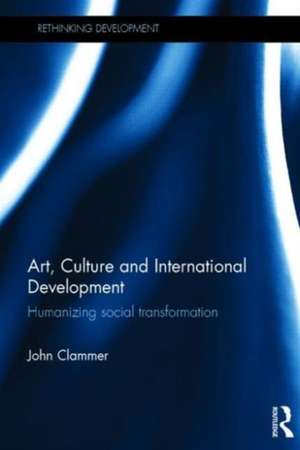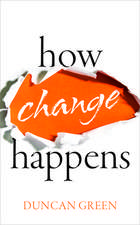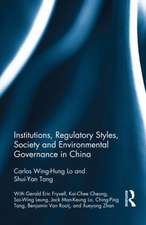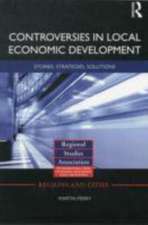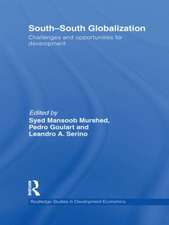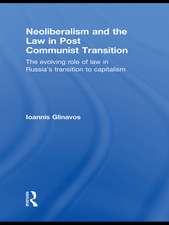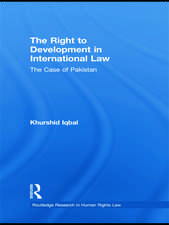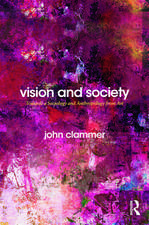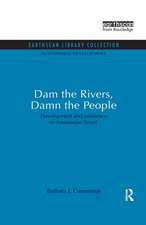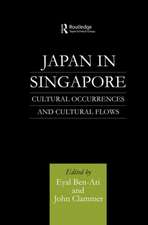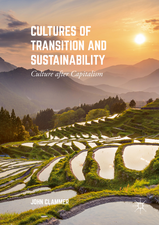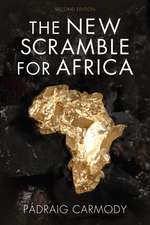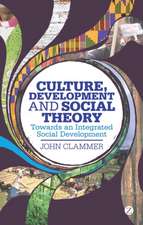Art, Culture and International Development: Humanizing social transformation: Rethinking Development
Autor John Clammeren Limba Engleză Hardback – 28 noi 2014
The book shows how the arts and development are related in very practical ways – as means to achieve development goals through visual, dramatic, filmic and craft-inspired ways. It advocates not so much culture and development, but rather for the development of culture. Without a cultural content to economic and social transformation the problems found in much development – up-rooting of cultures, loss of art forms, languages and modes of expression and performance – may only accelerate. Paying attention to the development of the arts as the content of development helps to amend this culturally destructive process. Finally, the book argues for the value of the arts in attaining sustainable cultures, promoting poverty alleviation, encouraging self-empowerment, stimulating creativity and the social imagination, which in turn flow back into wider processes of social transformation. Discussion questions at the end of each chapter make this book ideal to help foster further thinking and debate.
This book is an inspiring read for postgraduate students and researchers in the fields of development studies, cultural studies and sociology of development.
| Toate formatele și edițiile | Preț | Express |
|---|---|---|
| Paperback (1) | 381.60 lei 3-5 săpt. | +13.63 lei 7-13 zile |
| Taylor & Francis – 25 noi 2014 | 381.60 lei 3-5 săpt. | +13.63 lei 7-13 zile |
| Hardback (1) | 1161.28 lei 6-8 săpt. | |
| Taylor & Francis – 28 noi 2014 | 1161.28 lei 6-8 săpt. |
Din seria Rethinking Development
-
 Preț: 182.56 lei
Preț: 182.56 lei -
 Preț: 306.76 lei
Preț: 306.76 lei -
 Preț: 216.44 lei
Preț: 216.44 lei -
 Preț: 311.06 lei
Preț: 311.06 lei -
 Preț: 288.80 lei
Preț: 288.80 lei -
 Preț: 279.66 lei
Preț: 279.66 lei -
 Preț: 265.01 lei
Preț: 265.01 lei - 8%
 Preț: 381.60 lei
Preț: 381.60 lei -
 Preț: 266.27 lei
Preț: 266.27 lei -
 Preț: 284.73 lei
Preț: 284.73 lei -
 Preț: 293.88 lei
Preț: 293.88 lei -
 Preț: 280.89 lei
Preț: 280.89 lei -
 Preț: 303.30 lei
Preț: 303.30 lei -
 Preț: 302.97 lei
Preț: 302.97 lei - 18%
 Preț: 996.96 lei
Preț: 996.96 lei - 18%
 Preț: 1001.84 lei
Preț: 1001.84 lei -
 Preț: 354.32 lei
Preț: 354.32 lei -
 Preț: 321.50 lei
Preț: 321.50 lei - 18%
 Preț: 999.02 lei
Preț: 999.02 lei - 20%
 Preț: 298.64 lei
Preț: 298.64 lei -
 Preț: 295.58 lei
Preț: 295.58 lei -
 Preț: 356.44 lei
Preț: 356.44 lei -
 Preț: 326.90 lei
Preț: 326.90 lei - 18%
 Preț: 1164.44 lei
Preț: 1164.44 lei -
 Preț: 410.46 lei
Preț: 410.46 lei -
 Preț: 356.44 lei
Preț: 356.44 lei -
 Preț: 356.44 lei
Preț: 356.44 lei -
 Preț: 355.90 lei
Preț: 355.90 lei - 26%
 Preț: 763.39 lei
Preț: 763.39 lei -
 Preț: 442.68 lei
Preț: 442.68 lei -
 Preț: 287.61 lei
Preț: 287.61 lei - 18%
 Preț: 1001.84 lei
Preț: 1001.84 lei -
 Preț: 350.82 lei
Preț: 350.82 lei - 25%
 Preț: 768.30 lei
Preț: 768.30 lei - 18%
 Preț: 999.34 lei
Preț: 999.34 lei -
 Preț: 283.67 lei
Preț: 283.67 lei -
 Preț: 383.92 lei
Preț: 383.92 lei -
 Preț: 350.82 lei
Preț: 350.82 lei - 18%
 Preț: 1001.90 lei
Preț: 1001.90 lei - 26%
 Preț: 764.20 lei
Preț: 764.20 lei
Preț: 1161.28 lei
Preț vechi: 1416.19 lei
-18% Nou
Puncte Express: 1742
Preț estimativ în valută:
222.23€ • 230.61$ • 185.75£
222.23€ • 230.61$ • 185.75£
Carte tipărită la comandă
Livrare economică 15-29 martie
Preluare comenzi: 021 569.72.76
Specificații
ISBN-13: 9781138024717
ISBN-10: 1138024716
Pagini: 168
Dimensiuni: 156 x 234 x 11 mm
Greutate: 0.39 kg
Ediția:1
Editura: Taylor & Francis
Colecția Routledge
Seria Rethinking Development
Locul publicării:Oxford, United Kingdom
ISBN-10: 1138024716
Pagini: 168
Dimensiuni: 156 x 234 x 11 mm
Greutate: 0.39 kg
Ediția:1
Editura: Taylor & Francis
Colecția Routledge
Seria Rethinking Development
Locul publicării:Oxford, United Kingdom
Public țintă
PostgraduateCuprins
Preface 1. Art, Culture and Development: What Are the Connections? 2. Art as Social Enterprise: The Creative Sector in Relation to Poverty, Policy and Social Development 3. The Arts of Sustainability: Architecture, Design and Public Art 4. Performing Development: Theatres of the Oppressed and Beyond 5. Visualizing Development: Film, Photography, Representation 6. Writing Development: Literatures of Critique and Transformation 7. Arts Education for Development and Social Justice 8. Art, Culture and Integral Development
Recenzii
"Art, Culture and International Development offers a profound civilizational critique of contemporary predicament of development and presents us many important resources for development of a new culture of creativity. It challenges us to realize our manifold contemporary poverty in the midst of illusion of affluence on the part of a few—material, cultural and spiritual poverty—and urges us to strive for realizing ‘integral development’ in self and society in which arts in all their myriad manifestations—visual, crafts, literature, painting, and theatre—play an important role." – Ananta Kumar Giri, Madras Institute of Development Studies, India
"John Clammer brings fresh air to the field of development. The author proposes art and its transformative potential as a way to improve the living conditions of the poorest. Therefore, art, once a stronghold of the elites, would become a powerful resource for development. Clammer reinstates the expressive and creative capacity of vulnerable groups as a means of exploring alternative paths to the longed, but rarely achieved "well-being". This perspective on development -a field still hegemonized by hard data, and the logics of economics-is optimistic, and especially humane." – Marian Moya, University of Buenos Aires, Argentina
"Because of the provocative argument of including culture into holistic understandings of growth and wellbeing, this text is an inspirational account of what truly human approaches to social development can be and, alongside other texts in the ‘Rethinking Development’ series is a recommended reading for both seasoned practitioners and development studies students alike." – Jacqueline Priego-Hernandez, LSE Review of Books
"The book serves the purpose of demonstrating the potential influence of re-imagining cultural expression through arts. The case studies and wide variety of empirical examples are suitable for advanced students and practitioners. It should also find a wide audience in those with an interest in global artistic production." – Margath A. Walker, Department of Geography and Geosciences University of Louisville, USA
"John Clammer brings fresh air to the field of development. The author proposes art and its transformative potential as a way to improve the living conditions of the poorest. Therefore, art, once a stronghold of the elites, would become a powerful resource for development. Clammer reinstates the expressive and creative capacity of vulnerable groups as a means of exploring alternative paths to the longed, but rarely achieved "well-being". This perspective on development -a field still hegemonized by hard data, and the logics of economics-is optimistic, and especially humane." – Marian Moya, University of Buenos Aires, Argentina
"Because of the provocative argument of including culture into holistic understandings of growth and wellbeing, this text is an inspirational account of what truly human approaches to social development can be and, alongside other texts in the ‘Rethinking Development’ series is a recommended reading for both seasoned practitioners and development studies students alike." – Jacqueline Priego-Hernandez, LSE Review of Books
"The book serves the purpose of demonstrating the potential influence of re-imagining cultural expression through arts. The case studies and wide variety of empirical examples are suitable for advanced students and practitioners. It should also find a wide audience in those with an interest in global artistic production." – Margath A. Walker, Department of Geography and Geosciences University of Louisville, USA
Descriere
This innovative book places culture, specifically in the form of the arts, back at the centre of debates in development studies by introducing new ways of conceptualizing art in relation to development. It shows how the arts and development are related in very practical ways – as means to achieve development goals through visual, dramatic, filmic and craft-inspired ways. It advocates not so much culture and development, but rather for the development of culture. Without a cultural content to economic and social transformation the problems found in much development – up-rooting of cultures, loss of art forms, languages and modes of expression and performance – may only accelerate. It argues for the value of the arts in attaining sustainable cultures, promoting poverty alleviation, encouraging self-empowerment, stimulating creativity and the social imagination, which in turn flow back into wider processes of social transformation.
